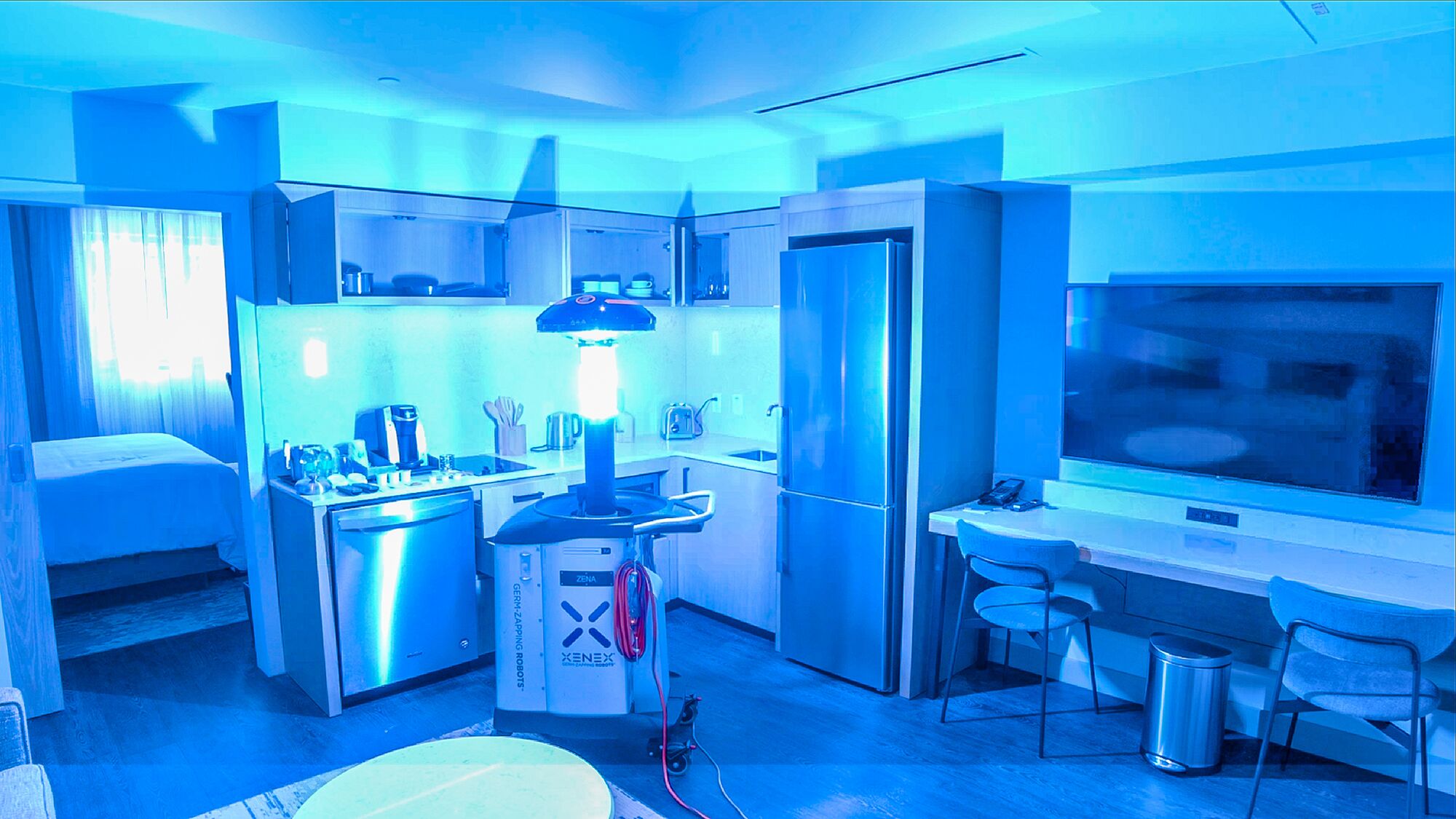A hotel property in the United States has deployed two decontaminating robots to sanitize and disinfect its guest rooms and common areas in order to help combat the threat of the 2019 Novel Coronavirus — which is also known as COVID-19 or 2019-nCoV — pandemic to guests.
Hotel Deploys Robots to Sanitize and Disinfect Rooms
“The room disinfection technology, provided by San Antonio-based Xenex Disinfection Services, was developed by two epidemiologists in Houston, with The University of Texas MD Anderson Cancer Center as their first customer”, according to this press release from the Westin Houston Medical Center hotel property, which is the first and only hotel property in the United States to use this particular technology. “LightStrike robots have been proven to quickly destroy viruses, bacteria, and fungi using intense pulsed xenon ultraviolet (UV) light. Hundreds of healthcare facilities use LightStrike robots to disinfect their facilities as part of their comprehensive infection prevention program and several hospitals have published peer-reviewed studies showing 50%-100% reductions in their Clostridium difficile (C.diff), methicillin-resistant Staphylococcus aureus (MRSA) and surgical site infection (SSI) rates after they used LightStrike robots and Xenex’s recommended protocols for room disinfection.”
Along with using the robotic room disinfection technology, The Westin Houston Medical Center is implementing enhanced cleaning and disinfecting protocols which include:
- All public areas and guestrooms are disinfected using hospital-grade TB Disinfectant Cleaner by Ecolab.
- All guest room consumable amenities and items — such as bath amenities, coffee, tea, and remote controls — are disinfected on-site and placed in sealed bags for guests.
- Removal of all non-essential items in guest rooms — such as magazines, collateral, and decorative pillows as three of many examples — to ensure a continually clean, disinfected environment.
- Abiding by the disinfectant cleaning protocols of EcoLab in all areas of the hotel property — including public areas, guest rooms, and back of house areas such as the kitchen.
- Assigning a dedicated member of the staff of the hotel property to use enhanced sanitizing methods on all guest-facing public areas — with coverage 24 hours per day.
This video shows the technology in action.
“The LightStrike robot uses intense germicidal UV light to disinfect rooms by quickly destroying microscopic bacteria and viruses that may be missed during the manual cleaning process”, according to the aforementioned press release. “Operated by hotel staff, the robot uses pulsed xenon (a noble gas) to create intense broad-spectrum UV light, unlike older technologies that use mercury bulbs (mercury is toxic) to create continuous, single spectrum UV light.”
Xenex is a world leader in infection prevention strategies and solutions based on ultraviolet technology. The mission of Xenex is to save lives and reduce suffering by destroying the deadly microorganisms which cause infections that are acquired in hospitals.
The hotel property has also created food and beverage offerings which are designed to boost immunity — including:
- A special immune system boosting menu packed with antioxidants, vitamins, probiotics and prebiotics for guests to ensure continued health.
- Immune Booster Kits — including an Energize Kit and a Travel Kit with tinctures; and Airborne products.
A Hotel Room Which Disinfects Itself?
The technology which is being employed at the Westin Houston Medical Center hotel property is not the only solution to disinfecting hotel rooms which are available, as another technology allows a hotel room to practically disinfect itself.
Brøchner Hotels has been embracing a new technology with which clean hotel rooms do not require the traditional attention which is given by members of the housekeeping staff.
Two of its hotel properties currently have rooms which purportedly clean themselves: Hotel Ottilia and Hotel Herman K — both of which are located in Denmark — became the first in the world to use a proprietary product known as ACT CleanCoat, which is manufactured by a company called ACT.Global in Kastrup. The transparent and odorless coating is purportedly specifically engineered to disinfect surfaces on which it is applied by using a natural process known as photocatalysis, during which natural humidity and oxygen are turned into free radicals by titanium dioxide in presence of light.
The process of photocatalysis is explained in this video.
…as well as this video:
According to the Danish company, surfaces which have been applied with the coating become self-disinfecting when activated by sunlight in the morning; and harmful microbes and chemical compounds — such as bacteria, viruses, airborne mold spores and volatile organic compounds — are safely decomposed and ultimately rendered harmless. The air inside of a hotel room can reportedly be purified for as long as one year if the coating is applied to all of the surfaces within the room, which means that cigarette smoke, odors and other contaminants will be removed; and guests will no longer be concerned about being infected with influenza, salmonella — and, allegedly, even allergens.
At a cost of approximately $2,500.00 for an entire hotel room to be coated with the product — the entire room must be completely emptied prior to its annual application — lodging companies are not exactly clamoring to embrace this technology just yet…
…but the cost savings of significantly reduced water consumption and the constant use of chemical products. Additionally, surfaces and materials would purportedly last longer, as they would not be in danger of having chemicals — such as bleach, for example — accidentally spilled on them.
What About Members of the Housekeeping Staff?
With both of the aforementioned technologies applied in rooms at hotel properties, housekeepers would theoretically no longer be required to work with harmful chemical detergents and cleaners — or, worse, breathe their fumes. They would still be needed to vacuum the floors, ensure that all linens are dry cleaned, and simply wipe down surfaces — but that would be about the extent of their roles in maintaining hotel rooms.
Because members of the housekeeping staff would have fewer things to do when maintaining a hotel room, the cursory cleaning means faster turnaround for guests — and without using chemical products which can cause allergic reactions and dry out the skin of those who use them.
Summary
When Starwood Hotels and Resorts first introduced the concept of rewarding guests with points when they refused to have their rooms cleaned and serviced for a certain period of time, members of housekeeping staffs were concerned that less work meant that some of them would lose their jobs — which prompted vocal anger and protests among them.
Because the labor load could be reduced by as much as half in hotel rooms which have been applied with these new technologies, does this new innovation mean a happier housekeeping staff — or could it stoke concerns of the obsolescence of some members, who may fear ultimately losing their jobs?
While these innovations sound like they could very well be revolutionary disrupters in the lodging industry worldwide, I am still cautiously skeptical that they are completely viable solutions, as I do not know the full extent of all of their drawbacks and disadvantages — which do include the expensive cost and the possible reduction of housekeeping staff.
With the potential to reduce microbes and allergens — and the overall potential to help protect and improve the environment — I cannot help but wonder if airlines will adopt usage of this product. After all, imagine the possibility of cleaner air and fewer incidents of allergies aboard airplanes with quicker turnaround times and shorter layovers of flights.
These technologies are designed to mitigate the six germ hot spots in hotel rooms — although I suspect more than six hot spots exist…
…but are these technologies truly effective in our favor for a reduced chance of feeling ill or sick — especially with the current pandemic of the 2019 Novel Coronavirus; and especially with people who do not practice the proper and thorough washing of their hands — or is this all overkill?
This article is the latest in a series pertaining to the 2019 Novel Coronavirus in an effort to get the facts out with information derived from reliable sources.
Other articles at The Gate which pertain to the 2019 Novel Coronavirus include:
- Change Fee and Cancellation Fee Policies and Waivers of 46 Airlines Due To 2019 Novel Coronavirus
- Up to 12 Ounces of Hand Sanitizer is Permitted Through Airport Security Checkpoints
- I Swear, If I Receive One More Message About How My Health and Safety are Their Top Priority…
- Four Reliable Resources For Travel and the 2019 Novel Coronavirus
- Just Shut Down the Entire Planet. Problem Solved?
- Stop the Hyperbole: Travel is NOT Banned Between the United States and Europe…
- Travel From Europe to the United States Suspended for Most Foreign Nationals For 30 Days
- My Unproven Secret to Not Contracting a Virus in Years
- Pandemic of 2019 Novel Coronavirus Declared by World Health Organization
- Official Warning Issued Against Travel by Cruise Ship Due to 2019 Novel Coronavirus by the Department of State of the United States
- Now the Entire Country of Italy is Under Quarantine
- 16 Million People Quarantined in Northern Italy
- Are Masks Effective Against 2019 Novel Coronavirus That People are Stealing Them?
- As Many as 46,000 People May Have Died in the United States Alone From…
- Lodging Companies Issue Travel Waivers and Elite Status Extensions 2020 Due to 2019 Novel Coronavirus
- Update: More Airlines Suspended Change and Cancellation Fees 2020 Due To Coronavirus
- Airlines Which Suspended Change and Cancellation Fees 2020 Due To Coronavirus
- Should You Be Concerned About Coronavirus?
- Travel Alert February 2020: Italy Now Affected by 2019 Novel Coronavirus
- Travel Alert February 2020: Northern Italy Now Affected by 2019 Novel Coronavirus
- Travel Alert February 2020: South Korea Now Affected by 2019 Novel Coronavirus
- A Deal to Antarctica Because of 2019 Novel Coronavirus — But Hurry
- Update: Do Not Travel to China Due to 2019 Novel Coronavirus, Says United States Department of State
- Travel Alert January 2020: Hong Kong Now Affected by 2019 Novel Coronavirus
- Update January 2020: Additional Airlines Issue Travel Waivers for 2019 Novel Coronavirus
- Travel Alert January 2020: 2019 Novel Coronavirus Affecting Air Travel
Source: Westin Houston Medical Center.

